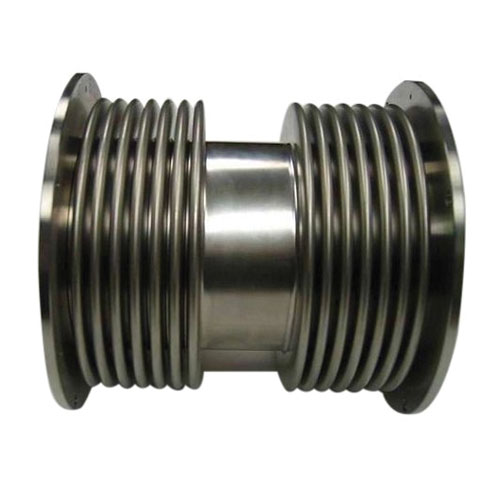Universal Expansion Joint for applications with primarily lateral movements
A Universal Expansion Joint contains two bellows with a connecting pipe or center spool between them. It is usually furnished with limit rods or full thrust tie rods, depending upon the service conditions. Tie rods or limit rods stabilize the center pipe connection and distribute movement evenly between bellows. Tie rods are required where it is necessary to absorb full pressure thrust and other externally applied loads.
Universal Expansion Joint are normally designed to absorb any combination of axial and lateral movement and angular rotation in multi-plane piping arrangements. They are extremely well suited to the absorption of large amounts of lateral displacement. The magnitude of the lateral displacement can be varied considerably because any increase in the length of the center pipe spool produces a corresponding increase in allowable lateral deflection. In installations involving large amounts of thermal change, where there is a change in elevation of the piping or where offsets exist, it is frequently possible to install Universal bellows expansion joints in the offset or drop leg, which will absorb considerably more movement laterally than can be absorbed in compression by standard units. Installation of an Universal Expansion Joint in such instances will usually result in a considerably reduced construction cost.
Easyflex Universal Expansion Joint utilize our standard one ply or Two-ply bellows elements as required by the application.
Simplest form of the universal expansion joint is the Dual Expansion Joint, which has two bellows separated by a center spool, and does not require ties rods since they are typically used in low pressure exhaust type applications, with significant lateral deflection.
Tied Universal Expansion Joint are usually constructed with either two sets of short tie rods, one set over each bellows, or with overall tie rods. A unit with the two sets of short rods is designed primarily to limit movement and stabilize the connecting pipe section. A unit with overall tie rods is designed to absorb full pressure thrust, to stabilize the connecting pipe section, and to absorb all external loads which are present, such as wind loads and weight of center pipe nipple where unit is exceptionally long.
